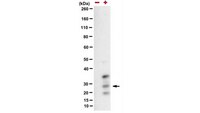Contribution of double-stranded RNA and CPSF30 binding domains of influenza virus NS1 to the inhibition of type I interferon production and activation of human dendritic cells
Irene Ramos 1 , Elena Carnero, Dabeiba Bernal-Rubio, Christopher W Seibert, Liset Westera, Adolfo García-Sastre, Ana Fernandez-Sesma
J Virol
87(5)
2430-40
2013
Show Abstract
The influenza virus nonstructural protein 1 (NS1) inhibits innate immunity by multiple mechanisms. We previously reported that NS1 is able to inhibit the production of type I interferon (IFN) and proinflammatory cytokines in human primary dendritic cells (DCs). Here, we used recombinant viruses expressing mutant NS1 from the A/Texas/36/91 and A/Puerto Rico/08/34 strains in order to analyze the contribution of different NS1 domains to its antagonist functions. We show that the polyadenylation stimulating factor 30 (CPSF30) binding function of the NS1 protein from A/Texas/36/91 influenza virus, which is absent in the A/Puerto Rico/08/34 strain, is essential for counteracting these innate immune events in DCs. However, the double-stranded RNA (dsRNA) binding domain, present in both strains, specifically inhibits the induction of type I IFN genes in infected DCs, while it is essential only for inhibition of type I IFN proteins and proinflammatory cytokine production in cells infected with influenza viruses lacking a functional CPSF30 binding domain, such as A/Puerto Rico/08/34. | 23255794
 |
Budding capability of the influenza virus neuraminidase can be modulated by tetherin
Mark A Yondola 1 , Fiona Fernandes, Alan Belicha-Villanueva, Melissa Uccelini, Qinshan Gao, Carol Carter, Peter Palese
J Virol
85(6)
2480-91
2011
Show Abstract
We have determined that, in addition to its receptor-destroying activity, the influenza virus neuraminidase is capable of efficiently forming virus-like particles (VLPs) when expressed individually from plasmid DNA. This observation applies to both human subtypes of neuraminidase, N1 and N2. However, it is not found with every strain of influenza virus. Through gain-of-function and loss-of-function analyses, a critical determinant within the neuraminidase ectodomain was identified that contributes to VLP formation but is not sufficient to accomplish release of plasmid-derived VLPs. This sequence lies on the plasma membrane-proximal side of the neuraminidase globular head. Most importantly, we demonstrate that the antiviral restriction factor tetherin plays a role in determining the strain-specific limitations of release competency. If tetherin is counteracted by small interfering RNA knockdown or expression of the HIV anti-tetherin factor vpu, budding and release capability is bestowed upon an otherwise budding-deficient neuraminidase. These data suggest that budding-competent neuraminidase proteins possess an as-yet-unidentified means of counteracting the antiviral restriction factor tetherin and identify a novel way in which the influenza virus neuraminidase can contribute to virus release. | 21209114
 |
Matrix protein 2 of influenza A virus blocks autophagosome fusion with lysosomes
Monique Gannagé 1 , Dorothee Dormann, Randy Albrecht, Jörn Dengjel, Tania Torossi, Patrick C Rämer, Monica Lee, Till Strowig, Frida Arrey, Gina Conenello, Marc Pypaert, Jens Andersen, Adolfo García-Sastre, Christian Münz
Cell Host Microbe
6(4)
367-80
2009
Show Abstract
Influenza A virus is an important human pathogen causing significant morbidity and mortality every year and threatening the human population with epidemics and pandemics. Therefore, it is important to understand the biology of this virus to develop strategies to control its pathogenicity. Here, we demonstrate that influenza A virus inhibits macroautophagy, a cellular process known to be manipulated by diverse pathogens. Influenza A virus infection causes accumulation of autophagosomes by blocking their fusion with lysosomes, and one viral protein, matrix protein 2, is necessary and sufficient for this inhibition of autophagosome degradation. Macroautophagy inhibition by matrix protein 2 compromises survival of influenza virus-infected cells but does not influence viral replication. We propose that influenza A virus, which also encodes proapoptotic proteins, is able to determine the death of its host cell by inducing apoptosis and also by blocking macroautophagy. | 19837376
 |











